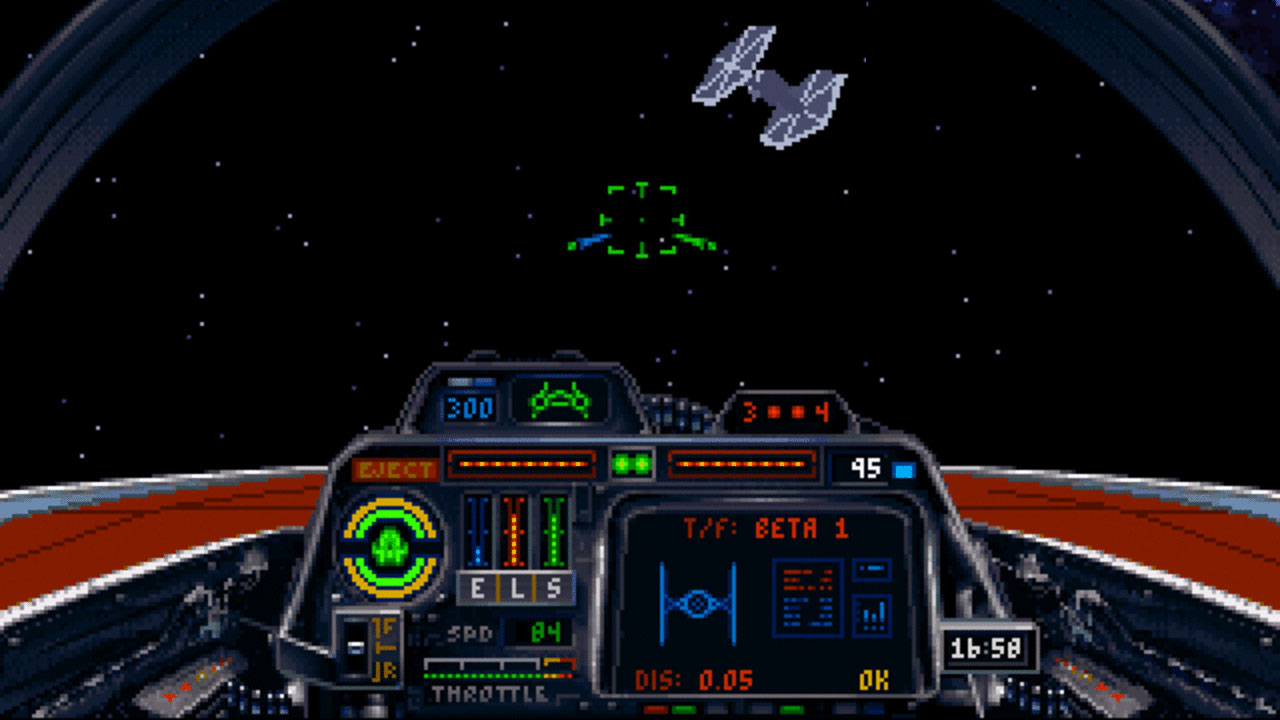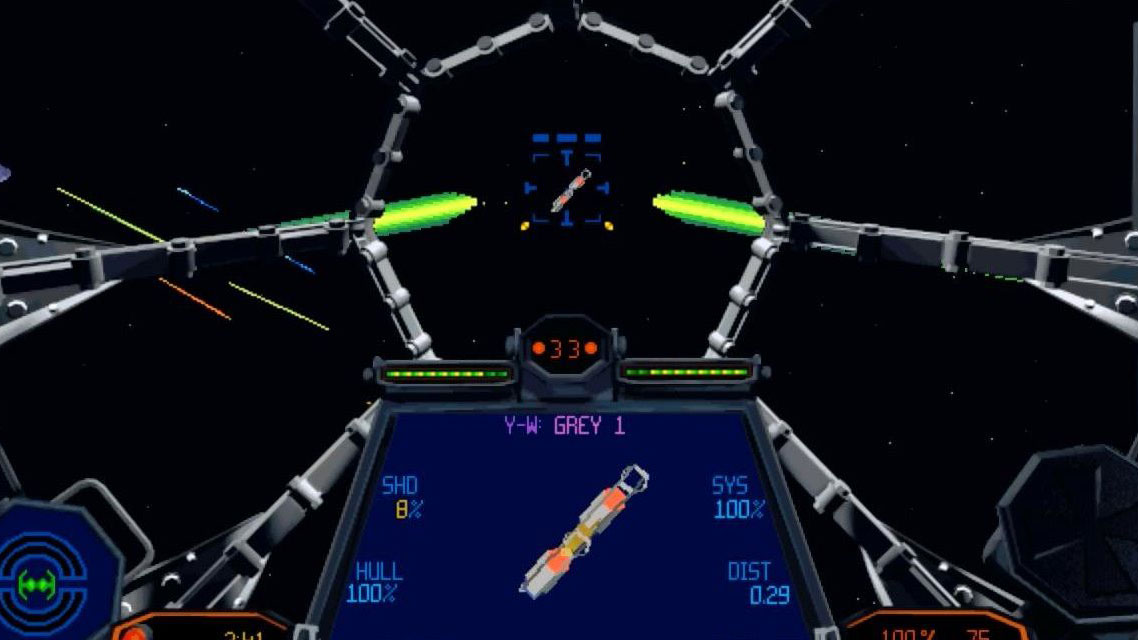Virtual Reality can change everything about how you play a video game.
The actions and muscle memories associated with common mechanics like running, picking up objects, and shooting can change completely, making even the most rote objectives feel new again. For developers, creating an inhabitable space generally means throwing out the game design rulebook and reimagining even core ideas about how players move and act in virtual space.
At the same time, we are living in a time when consumers crave familiarity. You’d be hard-pressed to find a mainstream AAA project that isn’t somehow already attached to an existing intellectual property. (Case in point: check out the new Ratchet and Clank, a game adaptation of a movie, which reboots a 14-year-old game franchise.)
It’s inevitable that, in time, some traditional game series will make the jump to VR. Some franchises, like Minecraft, already have direct ports in the works, but not every game so easily fits into VR’s new mold. Some of the game franchises may require a little more legwork to take the leap. With some series, this may seem like a daunting task; more trouble than its worth. But for others, particularly game brands currently sitting on the sidelines, a hardware-based shift might be the spark to inspire something new and exciting. After spending some time with the first crop of virtual games, we have a few ideas for how a few inactive game series might come to thrive on the Oculus Rift, HTC Vive, or PlayStation VR.
Condemned: Criminal Origins

The Xbox 360 launch title, Condemned: Criminal Origins, and its multiplatform follow-up, put players in the first-person shoes of FBI profiler Ethan Thomas, who fights and outfoxes violent strangers as he chases down the serial killer who framed him for murder. Though Condemned’s narrative left much to be desired, by many accounts, the creepy atmosphere made moment-to-moment experience of roaming through dark, abandoned buildings terrifying and engrossing.
Horror feels like one of the most ripe genres for VR gaming. People are afraid of what they don’t understand, and most of us have no idea what to expect in a VR game. Just as games like the original Resident Evil and Silent Hill used the limitations of the PlayStation hardware to make players feel out of control, so, too, could developer Monolith Productions find a way to do the same for the awkward, but immersive act of interacting within virtual reality.
Red Faction collection

THQ’s explosion-heavy first-person shooter was a pioneer in modifiable environments — its “GeoMod” mechanics allowed players to destroy whole buildings and blow holes in the rocky landscape of Mars. Games like Minecraft and Chunks, a voxel-based crafting game from Garry’s Mod developer Facepunch Studios, show how fun it can be to build something up around you virtually. If creating environments is that much fun, imagine how much fun it would be to destroy them.
Time Crisis series

The multiplex arcade’s favorite son returns, and with the help of room-scaling sensors, the series could finally move forward from 1990s arcade classic to modern VR spectacle.
For those who have forgottenn, the Time Crisis series was a first-person arcade shooter where players pressed a pedal to pop up from behind cover to shoot enemies using an IR-based light gun. Though a pedal-less version of the game came out on consoles, the game’s novelty never quite translated without the physical component.
Can the HTC Vive detect a desk or a table in the center of the room? Let’s assume it can. Instead of pressing a pedal, you actually kneel — or duck in a chair — to hide behind cover and reload. If Namco wanted to get real fancy, it could even make AI-controlled enemies that sneak around and outflank players behind cover.
Jumping Flash

The time is finally right for the original PlayStation’s wackiest launch title to return! Jumping Flash, a first-person 3D platformer, put players in control of a hopping bunny robot called Robbit. Though the premise was simple — finish the level within the time limit — the feeling of jumping high felt invigorating.
If Crytek can make a tired mechanic like climbing interesting again in VR, then surely Jumping Flash can reinvigorate the beloved platformer. This could, in fact, be a bright new day for first-person platformers, which never really gained a substantial following on consoles or PC. Maybe the enhanced sensation of jumping super-high in VR will bring the genre to new heights.
Star Wars: X-Wing and Star Wars: TIE Fighter
LucasArts’ classic space dogfighting sims, X-Wing, TIE Fighter and X-Wing vs TIE Fighter, were essential playing for an entire generation of PC gamers and Star Wars fans. That feeling of whizzing through space, taking out Empire (or Rebel) ships, generated the kind of feels in the early ’90s that VR can generate now.
As you might expect, the two key pieces of X-Wing and TIE Fighter are already available in VR. First, the Oculus Rift pre-order pack in EVE: Valkyrie offers spaceship fighter battles, albeit unlicensed. Second, HTC has shown a Star Wars demo on the Vive, though it’s lightsaber-based, instead of spaceship combat, and not currently available to the public.
With a new wave a Star Wars films already underway, a great X-Wing versus TIE fighter game doesn’t need to be a creative breakthrough to be a breakout success.
L.A. Noire

Team Bondi’s narrative-driven adventure game inspired by 1940s crime fiction relied on reading facial cues and examining crime scenes. These mechanics, which could seem mundane in a standard game, would translate very well to VR, which has a limited scope for physical movement, but excels at any genre where “detecting” (aka “looking”) is a primary mechanic.
Like the original, “Noire VR” could revolve around interviews and interrogations. Players would have to read the expressions and the body language of their subjects to determine whether or not they were getting the truth, a lie, or somewhere in between. Using facial capture software found in VR games like Werewolves Within that is capable of tracking players’ facial expressions, subjects might even be able to react to the player’s reactions.
Portal

Yes, there is already an extremely cool Portal-inspired tutorial and tech demo for the HTC Vive. That it’s compelling, even without allowing players to experience any of the series’ distinctive gameplay mechanics, only underscores just how amazing a Portal VR game could be.
In Valve’s iconic first-person puzzler series, players use a special gun to set the two ends of a portal that can transport people and objects to navigate puzzle rooms. Using portals isn’t limited to simply shooting one side at the exit and the other at a nearby wall; you’re asked to manipulate physics to leap across giant chasms and ascend great heights. One of the series’ classic “moves” involves crossing large chasms by dropping long distances into a portal, which then propels you across said gap. Can you imagine what that feels like?
Sure, there’s definitely a chance it might make you hurl; but Portal in VR might also be one of the most exciting things on the platform yet.
Bully

Rockstar Games’ beloved black sheep had players running around a prep school, disrupting (or attending) classes and beating up dweebs. Aside from the obvious capacity to enhance the experience for former bullying victims looking to dole out some schoolyard comeuppance, Bully’s Sim-like qualities might make it more palatable to the VR experience. While games like Job Simulator make a joke out of performing menial mini-game-like tasks, Bully could take those tasks and and turn them into actual games.
P.T. (Silent Hills)

Though Kojima Productions’ “playable teaser” was simply supposed to be a promotional gameplay experience for the canceled horror game, Silent Hills, the mysterious and terrifying demo, became a phenomenon in its own right.
P.T. messed with players by changing environments. Players would repeatedly walk through the same hallway repeatedly, only to find it’s been redecorated over and over again. The changes could be subtle — you walk past a framed photo, then return later to find a different photo in the same frame. They could also be downright loopy — you could walk down a hallway in your house, then turn around and find blood on the walls or a refrigerator hanging from the ceiling. The disorientation and psychological discomfort of having the environment shifting around you would definitely be an effective mechanic in VR. And don’t even get me started on VR jump scares.
Of course, with Konami all but getting out of the traditional video game market, an actual P.T. or Silent Hill VR game is pretty much out of the question, but that doesn’t mean the new Kojima Productions or any of a handful or enterprising studios couldn’t pick up where the teaser left off.
NFL Blitz

Electronic Arts would probably be more inclined to bring Football into VR through the Madden franchise, but NFL Blitz seems like a much better fit for the platform, at least for now. While simulating the experience of throwing a long touchdown pass might seem like a natural fit for VR, the lack of depth perception and general “awareness” of your body in space make football harder to replicate than, say, shooting robots out of the sky.
Luckily, Blitz, with its superhuman throws and hyperactive movement, could circumvent the problems that make a sports sim hard to pull off. No one’s going to mind that, as quarterback, you overthrew your receiver. No one’s going to cry foul over the fact that, as receiver, you jumped ten feet in the air to grab the ball. People may be interested in “simulating” football in Madden, where players’ approximation of the experience is driven by numbers and statistics. In VR, however, realism takes a back seat to simply feeling awesome, and a new Blitz could open the door and make that happen.




